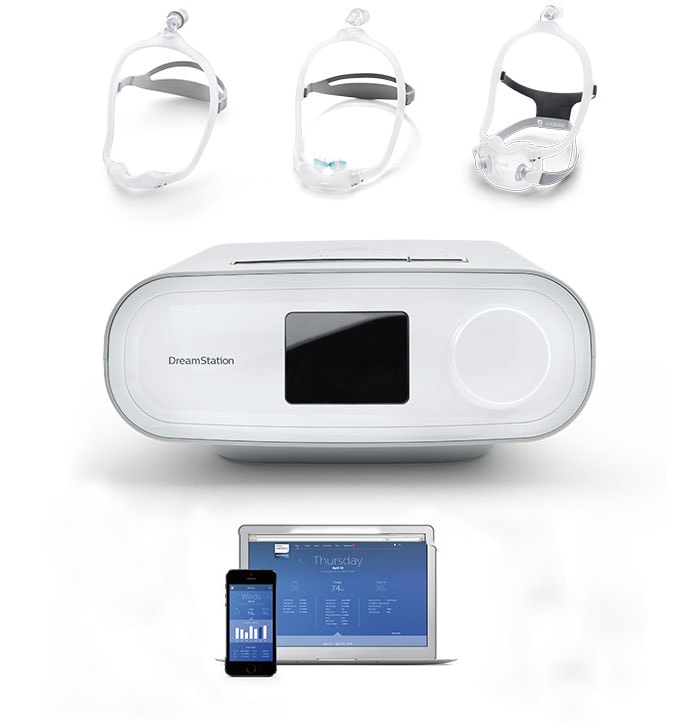About sleep apnea
Sleep apnea is a common sleep disorder characterized by repeated interruptions in breathing throughout the sleep cycle. These interruptions, called apneas, are caused by the collapse of soft tissue in the airway, which prevents oxygen from reaching the lungs.
Sleep apnea disrupts the sleep cycle and can dramatically impact energy, mental performance and long-term health. It’s important not to ignore potentially dangerous symptoms, such as snoring and excessive daytime sleepiness, and to consult a sleep specialist. Treatment can help you get the kind of sleep you need to help you feel more like yourself every day.
What are the risks of untreated sleep apnea?
Sleep apnea can have serious short and long-term health risks if left untreated including:
- High blood pressure
- Irregular heartbeat
- Heart disease / heart attack
- Stroke
- Type 2 diabetes
- Driving- and work- related accidents
User-friendly design helps put you in control

-
- DreamWear nasal masks, pillow masks and full-face masks attach to a flexible, over-the head frame.
You are about to visit a Philips global content page
Continue - Sleek, stylish DreamStation CPAP, BiPAP and Auto-adjusting machines are designed using patient feedback.
You are about to visit a Philips global content page
Continue - The small, packable DreamStation Go uses the same trusted technology as DreamStation.
You are about to visit a Philips global content page
Continue
Ingenious comfort
DreamWear mask system with your choice of Nasal, Pillows or Full Face cushions
User-friendly and quiet DreamStation sleep apnea therapy machines to match your personal needs
Motivation and daily feedback with the DreamMapper sleep apnea app, which connects with your DreamStation
Contact Us
Philips Dream Family is available at several authorized channel partners across India. Consult your sleep therapy physician before ordering.
For any assistance, please reach out to 1800 258 7678.
More sleep apnea solutions from Philips
Sleep apnea machines
Browse sleep apnea systems that provide therapy, enhanced comfort and tools to help you stay motivated.
Sleep apnea masks
We offer a variety of designs, such as Full-Face, minimal-contact, Pillows and pediatric masks.
Frequently asked questions
- What is obstructive sleep apnea?
-
Obstructive sleep apnea is a condition in which a person stops breathing repeatedly through the night. Breathing stops because the throat or “airway” collapses and prevents air from getting into the lungs. Sleep patterns are disrupted, resulting in excessive sleepiness or fatigue during the day.
- What should you do if you think you may have sleep apnea?
-
Evaluation by a doctor specializing in sleep disorders is recommended. Have a sleep study done. A sleep study can provide the doctor with information about how you sleep and breathe. This information will help the doctor to determine your diagnosis and treatment options.
- What are potential consequences of untreated sleep apnea?
-
There is possible increased risk for:
- High blood pressure
- Heart disease and heart attack
- Stroke
- Fatigue-related motor vehicle and work accidents
- Decreased quality of life
- What is the treatment for sleep apnea?
-
Most commonly, positive airway pressure (PAP) therapy is the treatment. It is noninvasive and can help with symptoms when used as prescribed. Less commonly, surgery or oral appliances are used, which may be effective in certain cases. Any treatment plan should include weight loss if needed, exercise and avoiding alcohol, sedatives and hypnotics.
- How does PAP or CPAP therapy work?
-
CPAP (Continuous Positive Airway Pressure) provides a gentle flow of positive-pressure air through a facial mask to keep the airway open during sleep. As a result:
- Breathing becomes regular during sleep
- Snoring stops
- Restful sleep is restored
- Quality of life is improved
- Risk for high blood pressure, heart disease, heart attack, stroke and motor vehicle and work accidents are reduced
- What can put you at increased risk for sleep apnea?
-
- Overweight/obesity
- A large neck or tongue
- Extra tissue or crowding in the airway
- What does an apnea episode look like?
-
- What are the benefits of regular usage of PAP therapy?
-
Most PAP users who remain committed to treatment enjoy:
- Increased energy and attentiveness
- Fewer morning headaches
- Reduced irritability
- Improved memory
- Increased ability to exercise
- Lower blood pressure
- Decreased risk of strokes and heart attacks
- Increased effectiveness at home and at work
- Improved overall quality of life
- What does a mask do?
-
Masks are used to deliver the air from the therapy device to you. A comfortable mask is a key factor in being able to use your treatment daily, so finding a mask that fits you and your lifestyle is important. Most masks have built-in exhalation ports that vent your exhaled air. Talk to your homecare provider about the different masks and headgear available.
- What does DreamMapper do?
-
DreamMapper is a mobile app that allows you to track your therapy progress, so you can take an active role in your sleep apnea therapy. You can also access DreamMapper through any browser.
Have a question?
We’re here to help
Find nearest authorized Dealer for product purchase
Find nearest authorized Service Centre
References
- DreamMapper is available currently in the US, Canada and certain international locations.
For informational purposes only, not to replace physician's directions.
Disclaimer :
*Philips makes no representations or warranties of any kind, express or implied, with regard to the accuracy or completeness of information, content or materials or views expressed herein by any author. It is not intended as a substitute for informed medical advice. The reader is cautioned not to use or replicate any information included herein to diagnose or treat any health problem or disease without consulting a qualified health care professional. Philips shall not be liable for any damages of any kind arising from the contents of this website, including but not limited to direct, indirect, incident, punitive and consequential damages.
